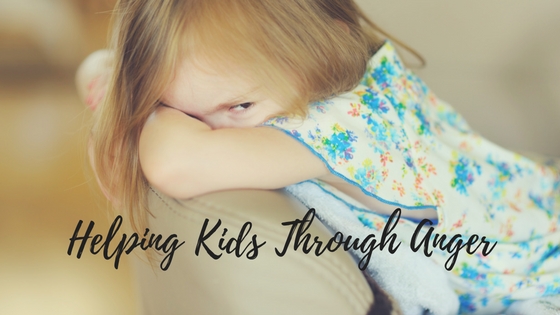Let me start out by saying that I haven’t always dealt with anger very well when it comes to my kids. We are all human. We all fail. Parenting is hard.
When my six-year-old son, a first-born child, was two years old, he started experiencing feelings of anger and rage that I didn’t know how to help him with at the time. Things got even more difficult when we added our second child just after he turned three years old. There have been many days that have been very frustrated and deeply sorrowful about his behavior. When he first started acting out, I began saying and doing things that I never thought I would say or do as a mother. Maybe you can relate to that person you never thought would come out as a mother…that inner monster of sorts. Yes, that has been me on several occasions. Not my most proud moments, to say the least. At the time I first found the monster, however, I had a newborn baby, was trying to adjust to life with two kids and I was doing most everything I could just to make it through the day and keep everyone alive.
I have learned a lot in these past few years, though, about how to help my child work through his feelings in an effective way and that monster rarely ever shows her face these days. I have always diligently prayed over my children and asked for wisdom to know how to be the best mother I can be to these children who have been sent to earth for me to raise. But, that doesn’t mean it’s always easy.
Vulnerability is my new “thing” these days. Thank you, Brene Brown, for your amazing book, Daring Greatly. I hadn’t even realized I carried so much shame around motherhood and the anger of my child until recently reading your amazing book.
And, after talking to other mothers who have dealt with similar issues with their children and are hiding in shame like I have for several years, I found it time to share some stories in hopes that you can be encouraged that you are not alone. You are not a bad parent. You can be and are good enough for your child. Please know that you are loved and supported as I recount some of the events that have happened in our own home and how we have successfully dealt with them….and in some instances, still deal with them.
1) Using Essential Oils for Their Emotions
In 2013, I had my second baby and that’s when we really started to grasp how much our oldest’s feelings were being challenged. Throughout my pregnancy he had mixed feelings on adding a baby to our family. He was set on having a girl, interestingly enough, and when we found out it was going to be a boy, he was crushed. For the remained of my pregnancy, he would tell people we were having a girl and tell me in private that he didn’t want a brother. He was deeply discouraged even after I told him he could teach him all his greatest baseball moves and how to pee on the tree in the back yard. Still, I didn’t realize how true his feelings really were until we brought our second son home. One moment he would be kissing his brother gently on the forehead and in the next moment, with my back turned, he would be taking a pillow to cover the baby’s face.
I became a nervous wreck and my three-year-old son began acting out by doing things such as banging his head on the tile floor and screaming at us. Three months into this behavior, I was very distressed. I had been using a blend of Vetiver and Lavender essential oils diluted in Fractionated Coconut Oil on his feet and along his spine in the times he would be in mid tantrum mode which helped  tremendously in the moment, but that wasn’t seeming to completely help him overcome his troubles. One night, I picked up a little book called Emotions and Essential Oils by Daniel MacDonald. Scouring it, I had high hopes that there might be some essential oils that could sooth his fragile emotions. I came across Frankincense “the oil of truth” and began sobbing. Frankincense emotionally supports feelings of abandonment, feeling unprotected, spiritual disconnected and those whom feel distant from their father. That very evening, my husband and I mixed him a bath of Frankincense, Clary Sage and Lavender, the latter two are also for calming and blend well with Frankincense. We bathed him often in this blend of oils and Epsom salt and began to see calm and peace come to him. Essential oils have absolutely played a big role in dealing with his emotions and the many array of emotions that our entire family dealt with. This mama used her fair share of Balance, Peace, and Serenity essential oil blends during these frustrating times. You can get more info on my favorite essential oils here.
tremendously in the moment, but that wasn’t seeming to completely help him overcome his troubles. One night, I picked up a little book called Emotions and Essential Oils by Daniel MacDonald. Scouring it, I had high hopes that there might be some essential oils that could sooth his fragile emotions. I came across Frankincense “the oil of truth” and began sobbing. Frankincense emotionally supports feelings of abandonment, feeling unprotected, spiritual disconnected and those whom feel distant from their father. That very evening, my husband and I mixed him a bath of Frankincense, Clary Sage and Lavender, the latter two are also for calming and blend well with Frankincense. We bathed him often in this blend of oils and Epsom salt and began to see calm and peace come to him. Essential oils have absolutely played a big role in dealing with his emotions and the many array of emotions that our entire family dealt with. This mama used her fair share of Balance, Peace, and Serenity essential oil blends during these frustrating times. You can get more info on my favorite essential oils here.
As he has grown, his tantrums have subsided (as many toddlers grow out of) and his emotions have turned more into frustration and anger when he is dealing with trying situations.
So, here you go. I am baring my soul to you…..
One late afternoon this past spring, I was prepping for an evening event in my home. My husband decided to take the kids to the ball park for a bit to hit some balls while I prepared dinner and some last-minute details for the evening. They left, knowing it would need to be a quick little outing. They were going to have to stop by Papa’s for the bats and gloves first. As they made their way down the road, my husband quickly realized that they weren’t actually going to have enough time to make this a purposeful outing and decided to come home, making plans to go another day when they could enjoy their excursion more fully. Now, if you have a child that doesn’t like a last-minute change of plans or a modification to his or her idea of what the plans are, you might guess what is about to ensue here. This change of plans quickly turned my son into a fit of rage. When they arrived back home, my son was nearly inconsolable. He was throwing things, yelling, and hitting. We were unable to calm him. However, I was concerned he would hurt himself or one of us. But, he was unwilling to hear us out. Listening to my intuition, I grabbed the Lemon essential oil (one that he has told me makes him feel happy) and rubbed some drops in my hands. I held him on our stairway as he continued to rage and cry, my husband standing in front of us looking desperately helpless. After a few minutes, I let him go and he went to sit on the couch, rocking himself back and forth. The aroma of the Lemon, “the oil of focus” which invokes feelings of happiness and joy and dispels feelings of confusion, was able to help him calm down enough to where he could come and talk to me and eventually apologize for his behavior.
These are just a handful of essential oils we have used around our home for these kinds of emotional outbursts. Everyone is supported by essential oils in different ways. I would encourage you to look into using them for emotional support, however. They can be an amazing tool!
2) Taking Anger Out Using Objects
I read an article a few years ago (unfortunately I can’t track it down) that talked about using pounding, kicking, hitting, throwing and swinging motions to dispel anger. No, no, no, not on people, but with objects. There ar e actually studies that show that pounding nails into a wall, fence or board will help diffuse the anger. In addition, throwing or hitting a baseball, kicking a soccer or football, or the motion of shooting a basketball can also relieve tense feelings. Thankfully, my children love these activities and we use this as a tool often, even just to get the abundance of energy out on some days.
e actually studies that show that pounding nails into a wall, fence or board will help diffuse the anger. In addition, throwing or hitting a baseball, kicking a soccer or football, or the motion of shooting a basketball can also relieve tense feelings. Thankfully, my children love these activities and we use this as a tool often, even just to get the abundance of energy out on some days.
Oh, boy, and do I have another story for you.
This past summer, I asked my son to clean up his toys in the living room. It was time to start our nighttime routine. In hindsight, I knew better. With kids like this, you must give them a 10 minute heads up and then a 5 minute heads up that it will be time to wrap up the playing and clean-up will be happening. But, I didn’t. Guess I just forgot that night. Lame. So, with no warning that it was time to pick up and head to bed, he became enraged. He was thrown off from what he was in the middle of doing and lost it. He began yelling, stomping around and even hit me a couple of times. At one point, he threw a stool and was then looking around with intention to find something to hit. He walked over to the bench seat window in our dining room (where thankfully the cloth shades were drawn) and punched out the window. As a mother, in that moment, you begin to doubt all of your parenting abilities. Certainly, no child of mine would actually do that or any of the things I just mentioned, right? But he did. And, what you do in the following moments can make it better or break the situation even worse. Thankfully, he was unharmed, so without saying a word more, I excused myself and stepped outside to breathe. My son was panicky. He was crying and saying “I hate myself” as he followed me to the front porch. I gathered my thoughts and stepped back inside to tell my husband that I was going to be taking my son over to my Dad’s house. I loaded up my son’s bike, his prized possession, into the trunk, because he had lost privilege that for a while. As we drove down the road, I rolled the windows down in the car and talked calmly to my son. “What is going through your head? What are you feeling that makes you want to punch a window out?” I asked sincerely. He gave me some feedback on his thoughts, which incidentally had nothing to do with cleaning up his mess. That is so often the case. These kids have thoughts and fears building up in their heads and hearts and it comes out in anger. Anger is a form of fear and in most cases, is coming out as a fear of the unknown. When we arrived, I got him out of the car into the driveway and we shot some hoops and continued our talk. By the end, he was clear in understanding that it would only be okay to punch the bed or the couch or a pillow in times of anger. Scream into a pillow if you like, but we draw the line at hitting people and things that could break or cause injury to ourselves or damage property. By shooting baskets and talking he was able to work out his angry feelings and we headed home to bed.
Mothers, just for the record, I am not okay with this rage and angry behavior in our home. It isn’t something that I brush off and allow as a normal reaction to not getting your way. But, it still happens on occasion. Which is why we have learned all of these coping mechanisms.
3) Asking the Right Questions and Listening To Your Kids
It is important to remember that anger and similar negative feelings that are building up inside of us most often have nothing to do with the scenario occurring in which these feelings actually come out.
I believe in creating a trusting opportunity for our kids to talk to us beginning at an early age so they can have the confidence to come to use with things as they grow older. That being said, combating kids’ anger with our own anger isn’t ultimately reaching a solution and building a trusting relationship with our children. Are we mad and extremely frustrated when our kids behave poorly? Yes, absolutely. But, we have a choice in these moments to either react or respond. I have found that if I can, I take my kids out of the environment in which the incident has occurred. Sometimes that is just outside or back inside. We also just learned the really cool technique of going outside and stomping your feet hard next to a tree and then giving the tree a big hug so that the tree can take all the anger and put it back into the earth through its roots and out through its branches. This little trick fits nicely with what I was discussing previously about using objects to take the anger out.
So, how do you know what questions to ask your child in these moments where rage or anger has just happened or is still happening in the moment? Well, I listen to my intuition a lot. Sometimes I put my hand over my heart and ask “what is it that I need to know in the moment to help my son through this?” But, you can simply start out with a question like “what is really happening in your heart right now?” You can say, “I see that you are very angry right now. How can I help you work through this? Would you like to talk this out with me because I am willing to listen to your feelings?” Or, perhaps, you can wait until the anger has subsided a bit and ask how you can better understand what they are going through. It isn’t easy, trust me, I know. But, if you respond or react in anger, which is often the way we really want to, you are losing trust and subsequently not allowing the opportunity for the situation to be diffused in a better way.
I have found that over the years that the really bad outbursts are fewer and farther between. He has tools to help him process and we have discussed how it feels when he knows he is about to be really angry. Sometimes he tells me that he is beginning to feel mad and I can often help him through it without a huge incident. He understands his voice starts to raise, his heart starts beating faster and he begins to clench his teeth. All of these things help him recognize that he needs to find a good outlet for his anger before it turns into more.
I often call my children to me, look them in the eyes and tell them that I love them very much. I share with each one that I am very proud of them and express my amazement in their greatest talents and achievements. I want them to feel love in our home, always. This also allows them to feel love even when I have to talk to them and guide them away from their challenging behaviors and the unwise choices they have made.
Ultimately, our children really want to know and feel that they are loved and heard and seen by us. I do not condone outbursts or angry and irrational behavior in my home, as I am sure you do not either. But, I am raising kids. It is a hard job, as you might know yourself, and those things happen. We do the very best that we can on a daily basis. We fail. A lot. And, each day, we receive the sufficient grace and the resilience to keep going.
Here’s to parenting our children with the best intentions, the most grace we can give them and the biggest hearts we have to offer.
Love to all of my fellow mamas.



